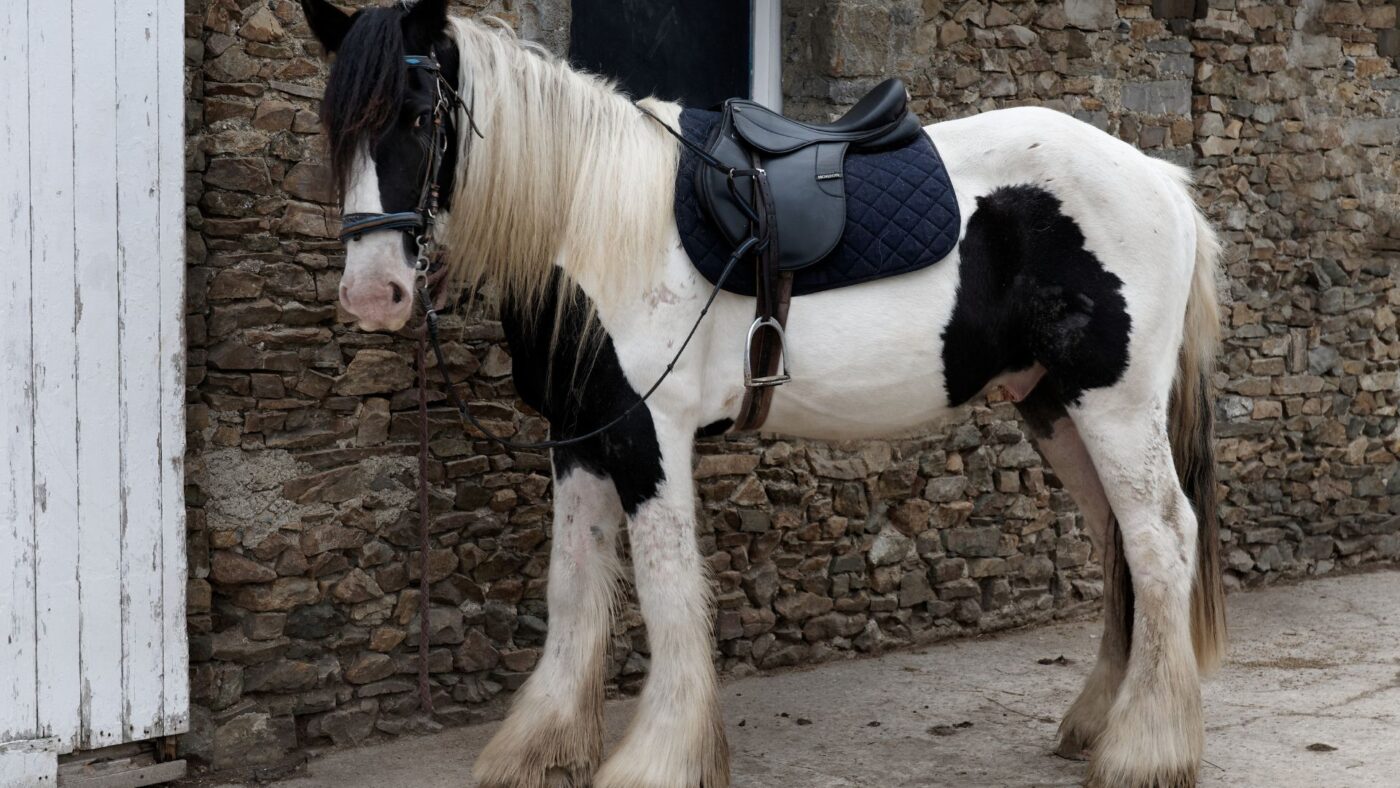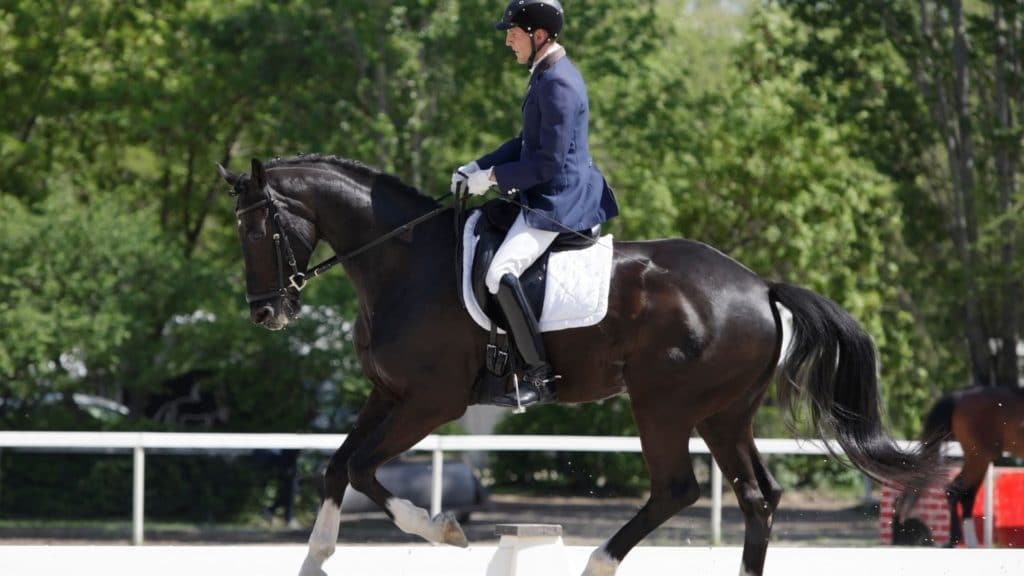Last updated: December 18, 2024
The right dressage horse isn’t just about skill—it’s about trust, temperament, and movement. Whether you’re starting your dressage journey or aiming for Grand Prix, choosing the right breed can make all the difference. From calm, forgiving partners for beginners to athletic powerhouses for advanced riders, this guide highlights the best horse breeds for dressage at every level.

Beginner Dressage Horse Breeds
If you’re just starting your dressage journey, choosing the right horse breed can make all the difference. Beginner-friendly breeds often prioritize calm temperaments and forgiving natures.
1. American Quarter Horse
Renowned for its calm demeanor, smooth gaits, and versatility, the American Quarter Horse is a fantastic choice for riders just starting out. Bred in the United States, these forgiving partners help build confidence and establish foundational skills.

Why They Excel for Beginners:
- Calm and steady temperament.
- Smooth, easy-to-sit gaits.
- Strong bond with humans and willingness to please.
Personal Insight:
I’ve always admired Quarter Horses for their patience and adaptability. Their forgiving nature makes them perfect for novice dressage riders learning balance and basic movements.
Related Content: Are Quarter Horses Good for Beginners?
2. Friesian
For riders who prefer a touch of elegance and grace, the Friesian offers both beauty and a calm personality perfect for learning dressage basics. While I’ve trained horses for other disciplines, I’ve noticed similar traits in breeds like the Quarter Horse and Friesian. Their trainability and willingness to connect with their riders are qualities valued across disciplines, including dressage.

Key Traits:
- Graceful, rhythmic movement.
- Gentle personality and trainability.
- Strong bond with riders.
- Explore grooming and care tips for Friesians.
At a dressage show I attended, I couldn’t take my eyes off a Friesian performing an extended canter. Its graceful movement and calm demeanor captivated the audience, and it was easy to see why they’re called ‘gentle giants.’ Watching them in action gave me a real appreciation for how well-suited they are to dressage.
Fun Fact: Friesians originated in the Netherlands and were once war horses, prized for their strength and bravery. Today, they shine in both dressage and exhibitions.
Related Content: Friesian Horse Facts and Temperament
3. Gypsy Vanner
The Gypsy Vanner is known for its calm personality and striking appearance, with thick feathering and a flowing mane. Originally bred as cart horses, they excel in lower-level dressage with their steady movement and trainability.

Why They Excel for Beginners:
- Gentle and willing to learn.
- Smooth, balanced gaits.
- Strong work ethic and easygoing nature.
While taking photos at a dressage event, I saw a Gypsy Vanner competing with a young rider. Its steady movement and calm presence in the arena made it clear why these horses are perfect for beginners.
Related Content: Gypsy Vanner Colors and Origins
Intermediate Dressage Horse Breeds
As riders advance in their skills, they need breeds with more athleticism and versatility to master intermediate dressage techniques.
1. Irish Sport Horse
The Irish Sport Horse blends the speed of the Thoroughbred with the strength of the Irish Draught, making it ideal for intermediate dressage riders.

Why They Excel:
- Athletic, uphill movement.
- Bold, trainable temperament.
- Versatility across disciplines, including eventing.
Related Content: Irish Sport Horses: Great for Dressage?
2. Danish Warmblood
Bred specifically for dressage, the Danish Warmblood is prized for its expressive gaits and responsive temperament.

Key Traits:
- Powerful, elastic movement.
- Intelligent and willing to work.
- Proven success in international dressage.
Learn more about Dutch Warmblood horses and their history
3. Selle Français
The Selle Français is a French warmblood with powerful hindquarters and exceptional balance. Known for their success in jumping, they also excel in dressage with their elegant movement.

Why They Excel:
- Athleticism and versatility.
- Smooth, balanced gaits.
- Proven history of success in dressage competitions.
Pro Tip: Learn how to feed your horse correctly to enhance performance.
Advanced Dressage Horse Breeds
At the pinnacle of dressage, advanced breeds must exhibit exceptional athleticism, expressive movement, and mental focus to shine on the international stage.
1. Dutch Warmblood
The Dutch Warmblood is a star of advanced dressage, known for its expressive gaits, power, and rideability.

Famous Example: Totilas, a legendary Dutch Warmblood, broke multiple dressage records with his awe-inspiring performances.
Why They Excel:
- Powerful, expressive trot and canter.
- Rideability for complex movements.
- Proven track record at Grand Prix level.
Olympic Spotlight: Dutch Warmbloods dominated the 2024 Dressage Olympics with 18 horses competing—more than any other breed.
Related Content: Dutch Warmbloods in Dressage
2. Hanoverian
The Hanoverian horse breed is synonymous with excellence in dressage. Known for their balance, strength, and fluid gaits, they are a top choice for competitive riders.

Key Traits:
- Balanced conformation and powerful hindquarters.
- Natural ability for collection and advanced movements.
Olympic Spotlight: Represented by 9 horses at the 2024 Dressage Olympics, Hanoverians remain a fixture in elite-level competition.
Famous Example: Satchmo, ridden by Isabell Werth, dominated international dressage competitions with grace and precision.
Related Content: Hanoverian Horses for Dressage
3. Oldenburg
The Oldenburg is renowned for its exceptional conformation and expressive movement, making it a popular choice for advanced riders.

Why They Excel:
- Exceptional gaits for upper-level dressage.
- Trainable and athletic.
- Versatile across multiple disciplines.
Olympic Spotlight: Oldenburgs were the second most-represented breed in the 2024 Dressage Olympics, with 14 horses showcasing their athleticism on the global stage.
Notable Sire: Donnerhall, an Oldenburg stallion, remains one of the greatest sires in dressage history.
4. Trakehner
The Trakehner is a highly respected warmblood breed, celebrated for its light, elegant build and remarkable athleticism. Originating in East Prussia, Trakehners were bred for versatility, excelling in dressage, show jumping, and eventing.

Key Traits:
- Refined, expressive movement.
- Exceptional stamina and endurance.
- Intelligent and highly trainable nature.
Many Trakehners have shone on the international stage, including in the 2024 Paris Olympics, where the Trakehner stallion Greek Air represented Finland with a stunning performance. Their natural grace and willingness to work make them a favorite for advanced dressage riders.
Notable Example:
The famous Trakehner stallion Gribaldi is a renowned sire in the dressage world, contributing to the bloodlines of many Olympic-level competitors.
Comparison Table: Dressage Breeds by Level
| Trait | Beginner Breeds | Intermediate Breeds | Advanced Breeds |
|---|---|---|---|
| Calm Temperament | ✓ Calm, forgiving | ✓ Balanced, trainable | ✗ Typically high-energy |
| Forgiveness of Errors | ✓ Very forgiving | ✓ Moderately forgiving | ✗ Requires precision |
| Trainability | ✓ Eager to learn | ✓ Highly trainable | ✓ Exceptional responsiveness |
| Athleticism | ✓ Suitable for basics | ✓ High athletic potential | ✓ World-class performance |
| Expressive Movement | ✗ Minimal expression | ✓ Moderate expression | ✓ Exceptional fluidity and power |
| Physical Endurance | ✓ Adequate for short sessions | ✓ Capable of prolonged training | ✓ Outstanding endurance |
| Collection Ability | ✗ Limited | ✓ Good | ✓ Exceptional |
| Suitable for Beginners | ✓ Ideal | ✗ Requires experience | ✗ Unsuitable for beginners |
Here is a YouTube video that discusses the best horse breeds for dressage.
FAQs About Dressage Horse Breeds
Curious about choosing the best dressage horse or how breeds differ in performance? These FAQs address the most common questions to help guide your decision.
What is the best horse breed for beginner dressage riders?
The American Quarter Horse and Friesian are excellent choices for beginners due to their calm temperament, smooth gaits, and forgiving nature.
Can any horse breed compete in dressage?
Yes, any horse breed can participate in dressage. While certain breeds like Warmbloods excel in advanced levels, breeds such as Paint Horses, Gypsy Vanners, and even Mustangs can succeed with proper training.
What traits are important in an advanced dressage horse?
Advanced dressage horses need exceptional movement, uphill balance, collection ability, and mental focus. Breeds like the Dutch Warmblood, Hanoverian, and Oldenburg are known for these qualities.
How much does a good dressage horse cost?
The price of a dressage horse varies widely, from $5,000 for a beginner horse to $100,000+ for advanced, competition-ready horses. Factors include the horse’s breed, training, and show record.
What is the difference between Warmbloods and Thoroughbreds in dressage?
Warmbloods, like the Hanoverian or Dutch Warmblood, are bred specifically for dressage with balanced movement and natural collection. Thoroughbreds, while athletic, are typically bred for speed but can still succeed in dressage with proper training.
Conclusion
Whether you’re a beginner or a seasoned competitor, the right horse breed can shape your dressage journey and elevate your performance. Whether you’re starting with a Quarter Horse or aiming for Grand Prix with a Dutch Warmblood, the best breed depends on your level and goals.
Have a favorite dressage breed? Share your stories, training tips, or questions in the comments below—we’d love to hear from you!
Note that each horse breed’s unique abilities make them suitable for specific events, from racing to other equestrian pursuits. Discover the best horse breeds for equestrian disciplines to explore their versatility.

About the Author: Miles Henry
Lifelong Horseman | Racehorse Owner | Published Author
Miles Henry brings over 25 years of hands-on experience training and owning Thoroughbred racehorses. Raised with Quarter Horses and Appaloosas, he’s spent a lifetime learning from horses—on the track, in the barn, and in the field. Today, he runs a small but successful racing stable in Louisiana and shares real-world insights on HorseRacingSense.com, helping horse owners, fans, and bettors navigate the sport with confidence.
📚 Books: View Miles’s books on Amazon »
🎧 Podcast Guest: Animal Tales Ep. 32 |
YouTube Interview
📩 Newsletter: Sign up for racing tips and horse care advice »
🔗 Follow Miles:
Twitter |
Facebook |
YouTube


